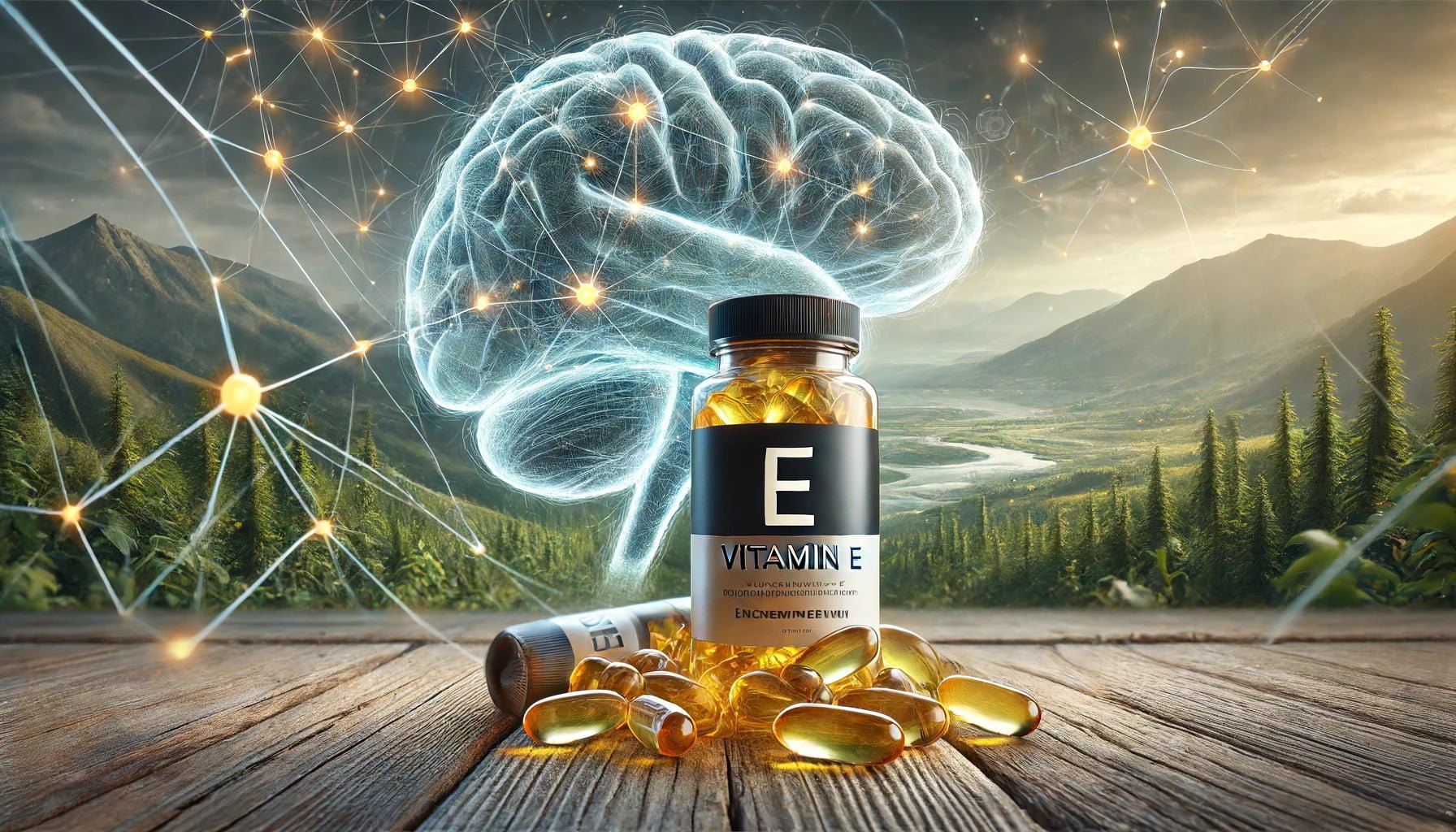
Vitamin E stands out as a nutrient for its facilitation towards sharper minds and healthier brains.
But how does vitamin E work, and what are the ideal ways to incorporate it into your regimen?
Read our compilation of all the relevant data on vitamin E’s efficacy as a nootropic.
Table of Contents
What is Vitamin E?
Vitamin E is a fat-soluble vitamin that acts as a powerful antioxidant in the body.
It’s a family of eight related compounds, including four tocopherols (alpha, beta, gamma, delta) and four tocotrienols (alpha, beta, gamma, delta).
Alpha-tocopherol is the most biologically active and abundant form in the human body.

As an antioxidant, vitamin E helps protect cells, tissues, and organs from oxidative stress and damage caused by harmful free radicals.
Vitamin E also plays a role in maintaining the integrity of cell membranes, especially in the brain and nervous system.
What Are The Different Forms of Vitamin E?
The eight different forms of vitamin E include:
- Alpha-tocopherol
- Beta-tocopherol
- Gamma-tocopherol
- Delta-tocopherol
- Alpha-tocotrienol
- Beta-tocotrienol
- Gamma-tocotrienol
- Delta-tocotrienol
While all forms have antioxidant properties, alpha-tocopherol is the most bioavailable and biologically active form in the human body. It’s the form preferentially absorbed and accumulated in the body. Most vitamin E supplements contain alpha-tocopherol.
Most vitamin E supplements contain alpha-tocopherol.
The tocotrienols are less common in the diet and not as well retained in the body compared to tocopherols. However, emerging research suggests they may have unique neuroprotective properties.
What Are The Dietary Sources of Vitamin E?
Good dietary sources of vitamin E include:
- Nuts and seeds (almonds, sunflower seeds, hazelnuts)
- Vegetable oils (wheat germ oil, sunflower oil, safflower oil)
- Green leafy vegetables (spinach, Swiss chard, turnip greens)
- Fortified cereals and juices
- Avocado
- Mango
- Kiwifruit
- Red bell pepper
- Asparagus
- Broccoli
- Fatty fish (trout, salmon, herring)
It’s important to note that vitamin E is fat-soluble, so consuming it with a source of fat enhances its absorption.
Cooking and processing can also reduce the vitamin E content of foods.
What Are The Functions of Vitamin E in The Brain and Body?
Vitamin E has several important functions in the brain and body:
- Antioxidant: As a fat-soluble antioxidant, vitamin E helps protect cell membranes and lipoproteins from oxidative damage. It neutralizes harmful free radicals and prevents lipid peroxidation. This is especially important in the brain, which is highly susceptible to oxidative stress due to its high lipid content and metabolic rate.
- Membrane Stability: Vitamin E is incorporated into cell membranes where it helps maintain their stability, fluidity, and permeability. This is crucial for the proper functioning of neurons and neurotransmission.
- Gene Expression: Vitamin E regulates the expression of certain genes involved in inflammation, cell signaling, and apoptosis (programmed cell death). It modulates the activity of transcription factors and influences cellular responses.
- Neurological Function: Adequate vitamin E status is important for optimal neurological function. It supports the health of neurons, myelin sheath, and neuromuscular junctions. Deficiency has been linked to neurological disorders like ataxia and peripheral neuropathy.
- Immune Function: Vitamin E enhances immune responses by stimulating the production of antibodies and supporting the function of T cells, B cells, and phagocytes. It may help protect against age-related decline in immunity.
- Cardiovascular Health: As an antioxidant, vitamin E helps prevent the oxidation of LDL cholesterol, a key step in the development of atherosclerosis. It also has anti-inflammatory and antiplatelet effects that support cardiovascular health.
How is Vitamin E Metabolized in The Body?
After ingestion, vitamin E is absorbed in the small intestine along with dietary fats and packaged into chylomicrons.
The chylomicrons are then transported via the lymphatic system into the bloodstream.
In the liver, alpha-tocopherol transfer protein (α-TTP) selectively binds to alpha-tocopherol and incorporates it into very-low-density lipoproteins (VLDLs).
This preferential binding is why alpha-tocopherol is the predominant form of vitamin E in the body. The VLDLs distribute vitamin E to peripheral tissues.
Excess vitamin E that is not bound to α-TTP is metabolized by cytochrome P450 enzymes in the liver. The metabolites, known as carboxyethyl-hydroxychromans (CEHCs), are excreted in the urine or feces.
In tissues, vitamin E is incorporated into cell membranes where it performs its antioxidant and non-antioxidant functions.
When vitamin E neutralizes a free radical, it becomes oxidized itself. It can be regenerated back to its reduced form by other antioxidants like vitamin C or ubiquinol. Adipose tissue is the main storage site, but vitamin E is also found in the liver, muscle, and other tissues.
The body has a limited capacity to store vitamin E, so regular dietary intake is important to maintain optimal levels.
How Bioavailible is Vitamin E?
The absorption efficiency of vitamin E is relatively low, ranging from 20 to 80% depending on the dose and formulation. Higher doses have lower fractional absorption.
Pro Tip: Emulsified or water-soluble forms of vitamin E may have enhanced bioavailability.
What Level of Vitamin E is Needed for Optimal Health?
Measuring vitamin E status typically involves assessing plasma or serum alpha-tocopherol concentrations. Levels above 12 μmol/L are considered adequate, while levels below 12 μmol/L suggest suboptimal status.
Erythrocyte vitamin E levels may be a better indicator of long-term status.
What Are The Cognitive Benefits of Vitamin E?
Vitamin E has several potential cognitive benefits because of its antioxidant and neuroprotective properties:
- Memory enhancement
- Neuroprotection
- Improved brain function
- Antidepressant effects
- Slowed brain aging

Note: More research is needed to fully understand the cognitive benefits of vitamin E and determine optimal dosing strategies.
How Does Vitamin E Improve Memory and Learning Abilities?
Vitamin E improves memory and learning abilities by reducing oxidative stress in the brain and enhancing acetylcholine levels (a neurotransmitter involved in memory and learning).
According to a clinical study, vitamin E supplementation significantly improved spatial learning and memory in aged rats.(1) It did this by reducing lipid peroxidation and increasing antioxidant enzyme activity in the hippocampus, a brain region critical for memory formation.
How Does Vitamin E Provide Neuroprotection?
Vitamin E provides neuroprotection by combating oxidative stress and inflammation in the brain.
As a potent antioxidant, it neutralizes harmful free radicals that can damage neurons and contribute to neurodegenerative diseases like Alzheimer’s and Parkinson’s.
A study from JAMA found that high-dose vitamin E supplementation (2000 IU/day) delayed functional decline in patients with mild-to-moderate Alzheimer’s disease.(2)
How Does Vitamin E Improve Brain Function?
Vitamin E improves brain function by supporting the integrity of neuronal membranes and enhancing cerebral blood flow.
It’s a key component of cell membranes, protecting them from oxidative damage and ensuring proper signaling between neurons.(3)
A clinical study demonstrated that vitamin E supplementation improved cognitive function in healthy older adults, possibly by reducing oxidative stress and improving cerebral circulation.(4)
How Does Vitamin E Reduce Anxiety and Depression?
Vitamin E reduces anxiety and depression by modulating the activity of neurotransmitters involved in mood regulation. It has been shown to increase levels of serotonin, a neurotransmitter associated with feelings of well-being and happiness.
A study from the Indian Journal of Psychiatry found that vitamin E supplementation significantly reduced anxiety and depressive symptoms in patients with generalized anxiety disorder.(5)
Additionally, vitamin E’s antioxidant and anti-inflammatory properties may help alleviate oxidative stress and neuroinflammation, which have been linked to the development of anxiety and depression.(6)
How Does Vitamin E Slow Age-Related Cognitive Decline?
Vitamin E slows age-related cognitive decline by protecting the brain from oxidative damage and supporting healthy brain aging. As we age, the brain becomes more susceptible to oxidative stress, leading to the accumulation of free radicals and cellular damage.
This oxidative damage contributes to the development of age-related cognitive impairments and neurodegenerative diseases.
According to research done in Switzerland, by neutralizing free radicals and reducing oxidative stress, vitamin E helps maintain optimal brain function and slows the progression of age-related cognitive decline.(7)
A meta-analysis from The Cochrane database concluded that vitamin E supplementation might be beneficial in slowing cognitive decline in older adults, particularly those with Alzheimer’s disease or mild cognitive impairment.(8)
What Are The Side Effects and Risks Associated with Vitamin E Supplementation?
Vitamin E is safe and well-tolerated when consumed in recommended amounts.

The tolerable upper intake level (UL) for adults is 1000 mg/day (1500 IU/day) of alpha-tocopherol.
However, high-dose vitamin E supplementation may have some potential side effects and risks:
- Bleeding Risk: High doses of vitamin E (above 400 IU/day) may increase the risk of bleeding, especially in people taking anticoagulant or antiplatelet medications. Vitamin E has mild antiplatelet effects that can prolong bleeding time.
- Hemorrhagic Stroke: Some observational studies have suggested an increased risk of hemorrhagic stroke with high vitamin E intakes, although the evidence is mixed.
- Prostate Cancer: The SELECT trial, a large randomized controlled trial, found that vitamin E supplementation (400 IU/day) was associated with a 17% increased risk of prostate cancer in healthy men. However, other studies have not confirmed this finding.
- Interactions with Medications: Vitamin E can interact with certain medications, including anticoagulants, antiplatelet drugs, chemotherapy drugs, and statins. It may enhance the effects of blood thinners and increase the risk of bleeding. Consult a healthcare provider before combining vitamin E supplements with medications.
- Nausea and Digestive Discomfort: Some people may experience mild gastrointestinal side effects like nausea, diarrhea, or stomach cramps with high-dose vitamin E supplements. Taking supplements with food may help alleviate these symptoms.
- Fatigue and Weakness: There have been rare reports of fatigue, muscle weakness, and decreased muscle tone with high-dose vitamin E supplementation. These effects are usually reversible upon discontinuation.
- Allergic Reactions: Rarely, vitamin E supplements may cause allergic reactions like rash, itching, or difficulty breathing in sensitive individuals. This is more likely with synthetic vitamin E or products containing additional ingredients.
The benefits of vitamin E outweigh the risks when consumed in moderation as part of a balanced diet or in recommended supplement doses (100-400 IU/day).
Remember, it’s always best to consult a healthcare provider before starting a new supplement regimen.
Who Should Avoid Using Vitamin E as A Nootropic?
While vitamin E is generally safe and beneficial for cognitive health, some people should avoid using it as a nootropic supplement:
- People with Bleeding Disorders: Vitamin E has mild antiplatelet effects that can prolong bleeding time. People with bleeding disorders like hemophilia or von Willebrand disease should avoid high-dose vitamin E supplements as they may increase the risk of hemorrhage.
- People Undergoing Surgery: Due to its antiplatelet effects, vitamin E may increase the risk of bleeding during and after surgery. It’s generally recommended to stop taking vitamin E supplements at least 2 weeks before elective surgery.
- People with Vitamin K Deficiency: Vitamin E may interfere with vitamin K metabolism and exacerbate the effects of vitamin K deficiency, which can impair blood clotting. People with vitamin K deficiency should avoid high-dose vitamin E supplements.
- People with Prostate Cancer or at High Risk: Some studies have suggested that high-dose vitamin E supplementation may increase the risk of prostate cancer, although the evidence is mixed. Men with prostate cancer or at high risk (e.g., family history, BRCA mutations) should consult a doctor before taking vitamin E supplements.
- Pregnant Women: While vitamin E is important for fetal development, pregnant women should avoid high-dose supplements as they may increase the risk of abdominal pain and premature rupture of membranes. The recommended daily allowance (RDA) for pregnant women is 15 mg/day (22.4 IU/day).
- Infants and Young Children: The safe upper limit for vitamin E intake in children is lower than in adults. Excessive vitamin E intake in infants and young children can lead to nausea, diarrhea, and other adverse effects. Consult a pediatrician for appropriate dosing.
- People with Hypersensitivity or Allergies: Rarely, some people may be hypersensitive or allergic to vitamin E supplements, especially those containing additional ingredients. If you experience symptoms like rash, itching, or difficulty breathing after taking vitamin E, discontinue use and consult a doctor.
- People with Certain Genetic Disorders: Rare genetic disorders like ataxia with vitamin E deficiency (AVED) and familial isolated vitamin E deficiency (FIVE) can impair vitamin E metabolism and lead to deficiency symptoms despite adequate intake.
Are There Any Known Medical Interactions With Vitamin E?
Yes, potential medical interactions with vitamin E:
- Blood thinners (warfarin, heparin)
- Antiplatelet drugs (aspirin, clopidogrel)
- Chemotherapy medications
- Statins (cholesterol-lowering drugs)
- Niacin (vitamin B3)
How To Use Vitamin E as A Nootropic?
To use vitamin E as a nootropic, it’s recommended to take a daily supplement containing 100-400 IU of vitamin E, preferably as mixed tocopherols and tocotrienols.
It’s also essential to choose a high-quality supplement from a reputable manufacturer to ensure purity and potency.
What is The Recommended Dosage of Vitamin E?
The recommended dosage of vitamin E as a nootropic is shown in the following:
| Guideline | Dosage |
|---|---|
| Starting dose | 100 IU per day |
| Standard dose | 100-400 UI per day |
| Upper intake level (UL) | 1000 mg (1500 IU) per day |
Warning: Exceeding the upper intake level (UL) dose may increase the risk of adverse effects, such as bleeding and hemorrhagic stroke.
How to Use Vitamin E in A Nootropic Stack?
Vitamin E can be effectively combined with other nootropics in a stack to enhance cognitive performance and brain health.
Some popular nootropics that synergize well with vitamin E include:
- Acetyl-L-Carnitine (ALCAR): ALCAR is an amino acid that supports mitochondrial function and energy production in the brain. When combined with vitamin E, it may enhance neuroprotection and cognitive performance.
- Omega-3 Fatty Acids: Omega-3s, particularly DHA and EPA, are essential for brain health and cognitive function. They work synergistically with vitamin E to reduce oxidative stress and inflammation in the brain.
- Ginkgo Biloba: Ginkgo is a popular herb known for its cognitive-enhancing and neuroprotective properties. It improves cerebral blood flow and has antioxidant effects that complement those of vitamin E.
- Phosphatidylserine (PS): PS is a phospholipid that supports neuronal membrane integrity and signaling. When combined with vitamin E, it may enhance cognitive function and slow age-related cognitive decline.
When creating a nootropic stack, it’s essential to start with lower doses of each ingredient and gradually adjust them based on individual response and tolerance.
- Takatsu, Hirokatsu et al. “Effect of vitamin E on learning and memory deficit in aged rats.” Journal of nutritional science and vitaminology vol. 55,5 (2009): 389-93. doi:10.3177/jnsv.55.389↩
- Dysken, Maurice W et al. “Effect of vitamin E and memantine on functional decline in Alzheimer disease: the TEAM-AD VA cooperative randomized trial.” JAMA vol. 311,1 (2014): 33-44. doi:10.1001/jama.2013.282834↩
- La Fata, G et al. “Vitamin E Supplementation Reduces Cellular Loss in the Brain of a Premature Aging Mouse Model.” The journal of prevention of Alzheimer’s disease vol. 4,4 (2017): 226-235. doi:10.14283/jpad.2017.30↩
- La Fata, Giorgio et al. “Effects of vitamin E on cognitive performance during ageing and in Alzheimer’s disease.” Nutrients vol. 6,12 5453-72. 28 Nov. 2014, doi:10.3390/nu6125453↩
- Gautam, Medhavi et al. “Role of antioxidants in generalised anxiety disorder and depression.” Indian journal of psychiatry vol. 54,3 (2012): 244-7. doi:10.4103/0019-5545.102424↩
- Lee, Ainsley Ryan Yan Bin et al. “Vitamin E, Alpha-Tocopherol, and Its Effects on Depression and Anxiety: A Systematic Review and Meta-Analysis.” Nutrients vol. 14,3 656. 3 Feb. 2022, doi:10.3390/nu14030656↩
- Lakhan, Ram et al. “The Role of Vitamin E in Slowing Down Mild Cognitive Impairment: A Narrative Review.” Healthcare (Basel, Switzerland) vol. 9,11 1573. 18 Nov. 2021, doi:10.3390/healthcare9111573↩
- Farina, Nicolas et al. “Vitamin E for Alzheimer’s dementia and mild cognitive impairment.” The Cochrane database of systematic reviews vol. 4,4 CD002854. 18 Apr. 2017, doi:10.1002/14651858.CD002854.pub5↩

